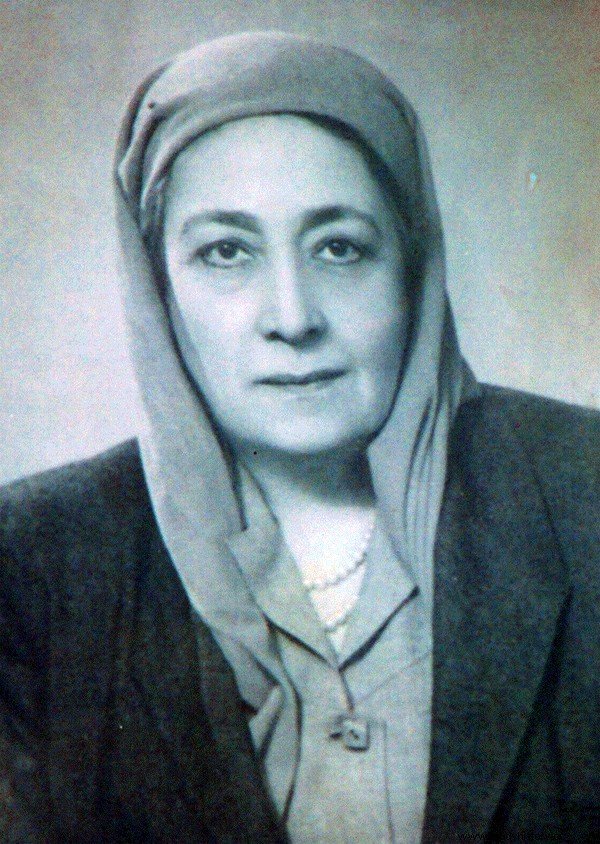Nur al-Huda Sultan, who became Huda Sharawi through marriage or Hoda Shaarawi (1879 – 1947) was a pioneer of Egyptian feminism.
An early marriage
 Daughter of Iqbal, slave, and Muhammad Sultan, Speaker of the House of Representatives, Nur al-Huda Sultan was born on June 23, 1879 in Minya in Upper Egypt (245 km south of Cairo). She spent her youth in the family home, in a harem run by her mother and her co-wife. Her father died when she was only five years old, and Huda and her little brother Umar were assigned a guardian:Ali Sharawi, a first cousin and politician. Coming from an important family, the little girl learns the piano, French and studies the Koran, but is not allowed to learn Arabic. It is French, taught by an Italian teacher, that she uses on a daily basis.
Daughter of Iqbal, slave, and Muhammad Sultan, Speaker of the House of Representatives, Nur al-Huda Sultan was born on June 23, 1879 in Minya in Upper Egypt (245 km south of Cairo). She spent her youth in the family home, in a harem run by her mother and her co-wife. Her father died when she was only five years old, and Huda and her little brother Umar were assigned a guardian:Ali Sharawi, a first cousin and politician. Coming from an important family, the little girl learns the piano, French and studies the Koran, but is not allowed to learn Arabic. It is French, taught by an Italian teacher, that she uses on a daily basis.
When she was twelve years old, Huda was betrothed against her will to Ali Sharawi. She initially refuses, seeing her cousin - an older man, married and already having daughters older than her - as a surrogate father, who has also never been kind to her. . But this marriage is the only solution not to lose her father's inheritance and, accused of wanting to dishonor her father's memory and harm her mother, Huda gives in. Iqbal obtains a monogamous marriage contract for his daughter, and Ali separates from his first wife to marry Huda, then aged thirteen. The little girl does not leave the paternal house, however, and Ali continues his relationship with his ex-wife.
Gradual conquest of autonomy
Shortly after, thanks to her marriage contract, Huda Sharawi manages to separate from her husband and gain some autonomy. Forging female friendships, she took a few lessons, went to the opera and frequented salons where many subjects were discussed. But this period did not last:in 1900, her brother let her know that he refused to marry until she married, and Huda had to give in to blackmail again. At 21, she remarried Ali Sharawi and started a new life as a wife and mother, raising their two children and traveling with him. In 1908, Huda and Ali went on vacation to Paris and the young woman admired the outfits of Parisian women there, having herself photographed in light, low-cut dresses. On her return to Egypt, she reconnects with the veil.
Shortly after, Huda created a dispensary, open to all without distinction of class or religious community, to which was added a school teaching domestic hygiene and childcare. Meeting with success, his institution became a hospital and a network of care establishments of the same type developed. In 1917, Umar died and the loss of this brother marked Huda deeply, who would later say that she only survived him for her children. In 1919, the godmothers of the Huda dispensaries, a group of women from high society, created a literacy and education association dedicated to underprivileged young girls.
The Egyptian Feminist Union
After the First World War, Ali participated in the creation of the nationalist Wafd party which fought for the independence of Egypt. Huda Sharawi joins her cause, and organizes nationalist demonstrations herself. In 1920, she created and chaired the Central Committee of the Wafd. In 1923, after the death of her husband, Huda founded the Egyptian Feminist Union (UFE), which defends women's rights and in particular access to education, university and public service. Drawing on her experience, Huda is very sensitive to issues of gender equality, and in particular to matters relating to the family:early marriage, polygamy. The same year, when she returned from an international congress in Rome, she decided not to put her veil back on. This political act earned him amazement and then international fame.
Huda devotes herself to her feminist and nationalist struggles. She took part in international conferences, sponsored associations and in 1925 launched an openly feminist Arabic-language magazine, L’Égyptienne. , whose editor-in-chief is her best friend Céza Nabaroui. They articulate the demands of Egyptian women with international feminist movements. Twelve years later, she also created a magazine in Arabic whose title is the exact translation of L’Égyptienne (Al-Misriyah ), but whose content changes. From Egyptian feminism, she broadened her struggle to Arab feminism and, in general, to the unity of the Arab world. In 1944, Huda organized the first Arab feminist congress in Cairo, which linked feminism and pan-Arabism. A few months later, the Arab League is founded and it does not include any women. Huda criticizes this:"The League whose pact you signed yesterday is only half a League, the League of half the Arab people".
On December 12, 1947, Huda Sharawi died during a cholera epidemic.
